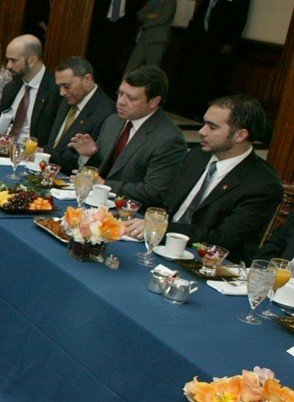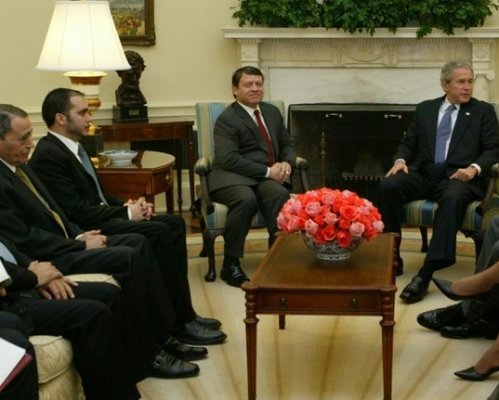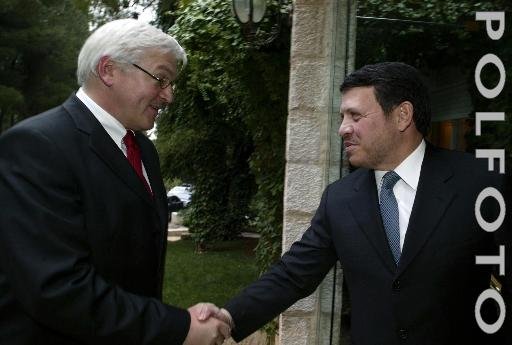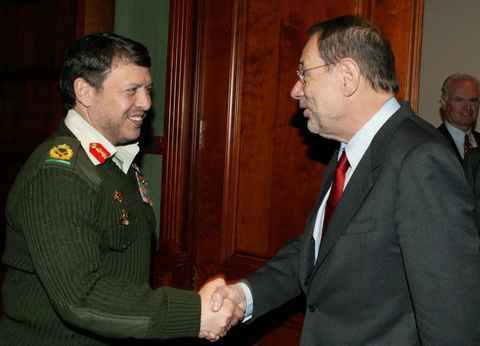Queen Rania of Jordan
Bordering on Israel and Saudi Arabia, Jordan is a key U.S. ally in the Middle East. Virtually all of Jordan's residents are Muslim.
Their 31 year old Queen Rania says now more than ever it is important to clarify misconceptions about her religion, Islam and Muslim women.
Oprah: You were recently here in New York, and as I understand it, you went to Ground Zero with Mayor Giuliani. What was that like?
Queen Rania: I think for the past couple of weeks we've all been struggling with what happened on September 11, trying to understand it, trying to make sense of it. We've all been glued to our televisions trying to comprehend what happened. It really made a difference to me when I was actually there, when I went to Washington and New York, and visited some of the family centers.
I had the opportunity to speak to some of the families of the victims, some of the children who have been orphaned and some of the workers who had been working day in and day out. I began to really understand and appreciate the enormity of the tragedy, and the extent of it, and just how many people were affected by it. It was very, very difficult for me, but I was very inspired by the resolve and the strength of the people that I saw.
Oprah: I've heard you say that as we attempt to fight this war against terrorism, whether it is militarily, diplomatically, through other resources, that this is an opportunity for the United States to perhaps reach out to other disenfranchised countries. Is that true?
Queen Rania: Absolutely. I think that this is a new chapter in human dialogue between the United States and the rest of the world and between countries all over the world. For the first time in history, we all have a combined objective. We all have this common enemy, terrorism. We all need to draw our resources together and fight the common war, each [country] in its own area of expertise, whether it's through intelligence, militarily or economically. It's very important that we all come together on this issue and really fight this war together.
Oprah: When this first happened on September 11, I think it came as a shock to so many of us that other people in the world hated us so much. Can you help explain that to us?
Queen Rania: I think it's very important that you realize that for the majority of Muslims, they do not hate Americans. They do not hate the American way of life. In fact, many countries look at the American model as one that needs to be replicated, one that they aspire to achieve.
We are talking about a minority of people who feel that they have been unjustly treated by the United States. Some of them feel that U.S. foreign policy might have been partial and not completely fair to all parties involved, and they wanted their voice to be heard. Unfortunately, the means that they have used are ones that are condemned all over the Arab world.
We do not approve of these terrorist acts or any gruesome activities like the ones we saw on September 11. The American people have to realize that the whole world is with them, they feel with them. They are not hated by the rest of the world. Some people feel unfairly treated, but I think that dialogue is the way to understand each other and to reach out to each other.
Oprah: What we're trying to do on this show today is to bring about an understanding of what it's like to be Muslim in the world, and what is Islam. I think there's a lot of confusion. You're very westernized, and then we see women wearing the hoods, the burqas and the hijabs. What makes one acceptable, and the other not? Are you accepted in your country not wearing the scarves? What does the scarf represent?
Queen Rania: I'd really like to commend you for having Islam as the subject of your show. I think this is the right time to reach out and have this open, ongoing dialogue about different religions.
[Just] like in Christianity, there are different interpretations of Islam, and there are different degrees of conservatism. It's a personal choice. Some people are more conservative than others. The important thing is the spirit of Islam. That is all about tolerance, about doing good, diversity, quality, and human dignity.
The fact that Islam is very tolerant means that it doesn't impose anything on other people. You are supposed to behave in a certain way, or dress in a certain way out of conviction, not because somebody imposes their own ideology on you. I believe one's relationship with God, and how one chooses to practice religion, is an intensely personal choice.
Oprah: So you as an individual choose whether or not you want to be robed or not robed, or wear your head covered or not? That's not imposed upon you by your religion?
Queen Rania: In our country, that is what we believe. We give women the choice to wear the headscarf or not. It's a personal choice. As I said, it is not the state that is supposed to impose on individuals what they believe in. That is their own personal choice.
Oprah: Are you a practicing Muslim?
Queen Rania: Yes, very much so. Muslims are required to pray five times a day. We fast the holy month of Ramadan, which is, I guess, equivalent to Lent in Christianity. We are meant to give to charity. Once in our lifetime, we have to make a pilgrimage to the holy site of Mecca. These are the basic principles and practices of Islam. But more importantly, Islam is about spiritual fulfillment, about morals, about trying to purify your soul. That is something that has to be very much emphasized.










